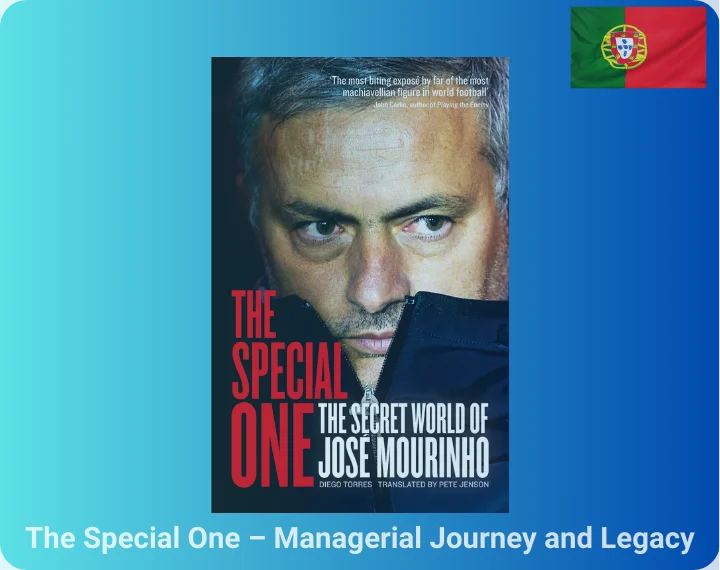José Mourinho: The Special One – Managerial Journey and Legacy
José Mourinho “The Special One” now commands a place in history as one of the most notorious managers in modern football owing to his incredible success in multiple European leagues. He was, and still is, known for his unparalleled tactical mind, which was also highlighted by his controversial persona. From the beggining as a translator under Bobby Robson and Van Gaal, Mourinho’s claim to fame came due ot his unique blend of reshaping strategies to best suit a team, something which every major league desperately needs.
Mourinho’s reputation was forged when he managed FC Porto, followed by Chelsea, Inter Milan, RM, and later on, Manchester United and Tottenham Hotspur. During his tenure, he adopted a pragmatic style of play where defense and counter-attacking football was prioritized, thus creating teams that were both sturdy and ruthless. This influence remains ever-present. History will remember his stunning treble with Inter Milan in conjunction with those record-breaking seasons at Real Madrid.
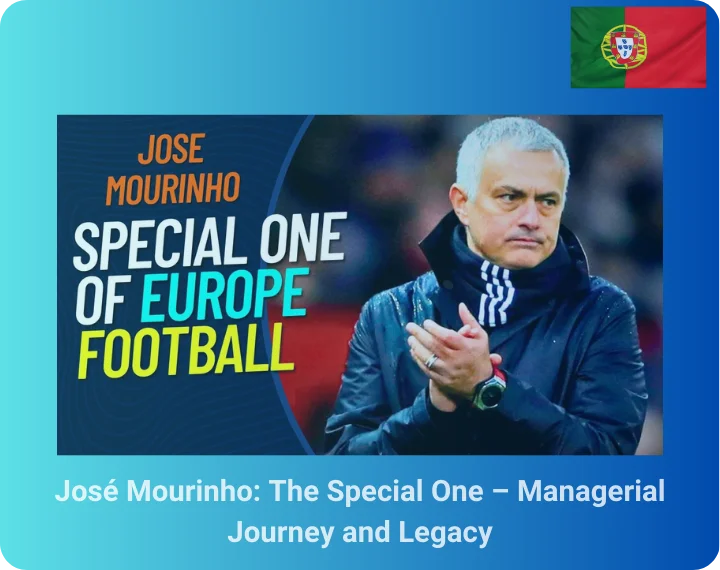
Early Coaching Foundations
José Mourinho’s path to managerial glory started even before he was often referred to as “The Special One.” His future success was paved by a succession of formative experiences that influenced his early coaching foundations. At first, Mourinho’s career was focused on the art of coaching rather than playing. His experience as an assistant coach at several elite clubs sharpened his tactical perceptions and strategic thinking.
- As a translator and assistant to Bobby Robson at Sporting CP, Mourinho gained his first significant experience to professional football. Through this position, he was able to see and pick up tips from a reputable manager, gaining practical coaching and strategic planning experience.
- Working with Louis van Gaal at Barcelona: Mourinho contributed to the development of his knowledge of contemporary football tactics while working with Louis van Gaal at Barcelona. Mourinho learned crucial coaching techniques from van Gaal, who served as his mentor, and these would eventually shape his own management approach.
- Mourinho’s tactical development was significantly influenced by his experience at FC Porto as an assistant, first under Robson and then under van Gaal. The shift from assistant coach to head coach was facilitated by these early experiences for Mourinho.
Mourinho gained the abilities and knowledge required to become one of the most successful football managers in the world during these formative years of his career.
Translating and Assisting at Sporting CP and Porto
As a translator for Sporting CP’s then-manager Bobby Robson, José Mourinho began his managerial career with the team. Despite not being in the spotlight right now, Mourinho was quietly absorbing all of the seasoned manager’s tactical expertise. He would quickly learn the ins and outs of coaching professional football and be instrumental in relaying Robson’s directives to the players. His understanding of the tactical and linguistic barriers that separate players and coaches was the first step toward becoming a coach.
Before joining Barcelona as an assistant coach under another legend, Louis van Gaal, Mourinho quickly relocated to FC Porto, where he temporarily assisted Robson. This experience proved invaluable as Mourinho improved his understanding of tactical systems and the importance of careful match preparation. Van Gaal’s careful and methodical approach had a lasting impact on Mourinho’s tactical development.
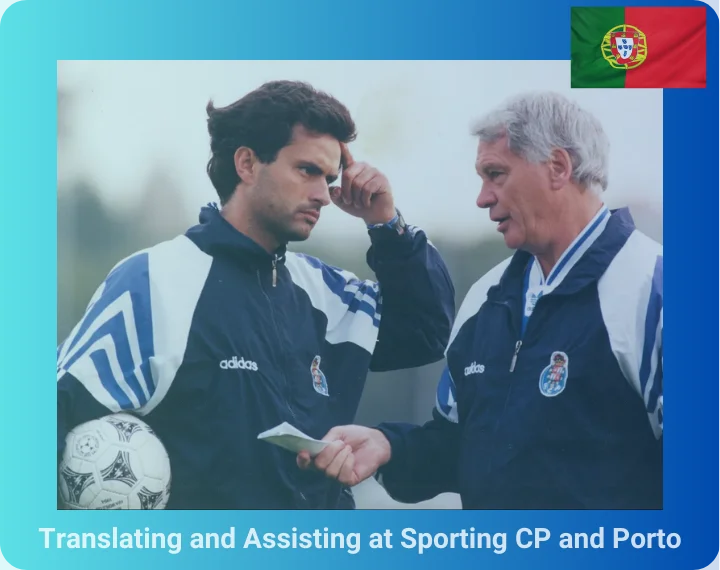
Learning Under Bobby Robson and Louis van Gaal at Barcelona
Mourinho’s time at Barcelona under Bobby Robson and later Louis van Gaal was pivotal in shaping his managerial philosophy. Robson’s focus on attacking football, combined with van Gaal’s meticulous tactical discipline, allowed Mourinho to develop a well-rounded coaching style that balanced creativity and control. Under van Gaal, Mourinho observed how to manage high-profile players and navigate the complexities of a large club.
His knowledge of player psychology, strategy, and match preparation has grown as a result of his encounters with some of the top football minds and his experience in the locker room. Mourinho learned a lot during these years at Barcelona, which prepared him for the tactics and concepts he would later apply while leading elite teams throughout Europe.
Transition from Assistant to Head Coach
For Mourinho, the move from assistant to head coach made sense. In 2002, Mourinho returned to Porto and took over as head coach after learning from head coaches Robson and van Gaal. He’d earned his chance, and he made a name for himself right away with a combination of a clear vision for squad organization and acute tactical awareness. He rose quickly, but it was the result of years of planning, education, and adaptation.
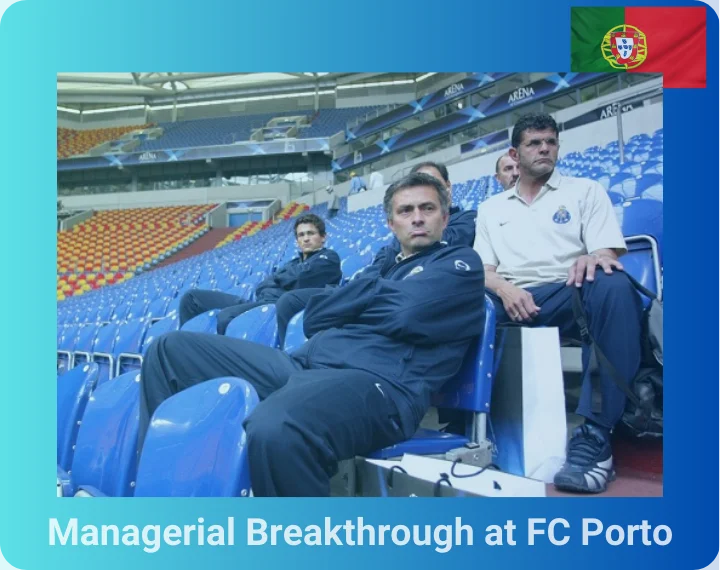
Managerial Breakthrough at FC Porto
Domestic Dominance and Tactical Mastery
At FC Porto, José Mourinho’s management career really took off, showcasing his capacity to rule at home. Under his direction, Porto won consecutive Primeira Liga titles and became an unstoppable force in Portuguese football. With an emphasis on strong defense and swift, straight counterattacks, Mourinho established a methodical yet successful approach. His Porto teams demonstrated his tactical savvy by combining the discipline van Gaal had taught him with the inventiveness he had picked up from Robson.
UEFA Cup and Historic 2004 Champions League Triumph
Mourinho’s Porto side reached the pinnacle of European football in 2004, winning the UEFA Champions League in a stunning final against AS Monaco. Porto’s 3-0 victory was a testament to Mourinho’s strategic brilliance, as his tactical plan shut down Monaco’s potent attacking threats while exploiting their defensive weaknesses. The Champions League title marked the beginning of Mourinho’s rise to global prominence, elevating him from a domestic manager to a European coaching superstar.
Rise of “The Special One” Persona
For both Porto and Mourinho’s career, the 2004 Champions League victory marked a turning point. The moniker he gave himself, “The Special One,” came to represent his self-assurance and faith in his skills. Additionally, it signaled the start of his captivating and frequently contentious appearance. Throughout his career, Mourinho became one of the most identifiable people in football thanks to his daring remarks and media savvy, which helped build a brand around him.
Chelsea Era – First Spell (2004–2007)
Premier League Titles and Defensive Solidity
The 2004 transfer of Mourinho to Chelsea turned out to be a game-changer for English football. Mourinho was entrusted with bringing success to the club, and he accomplished it spectacularly with the help of Russian billionaire Roman Abramovich. His Chelsea team had an almost impenetrable back four and was built on a strong defensive basis. Chelsea dominated the Premier League and won the championship in his first two seasons as manager because to their strong defense. His strategy changed the way English football viewed defense by emphasizing rapid transitions and excellent organization.
Creating a Winning Mentality in England
Beyond only tactics, Mourinho helped Chelsea develop a winning attitude that had been absent for many years. He made Chelsea a dominant power in English football by inspiring players and giving them hope for victory. Players like John Terry, Didier Drogba, and Frank Lampard flourished under his tutelage and were essential to Chelsea’s ascent to the Premier League’s top spot.
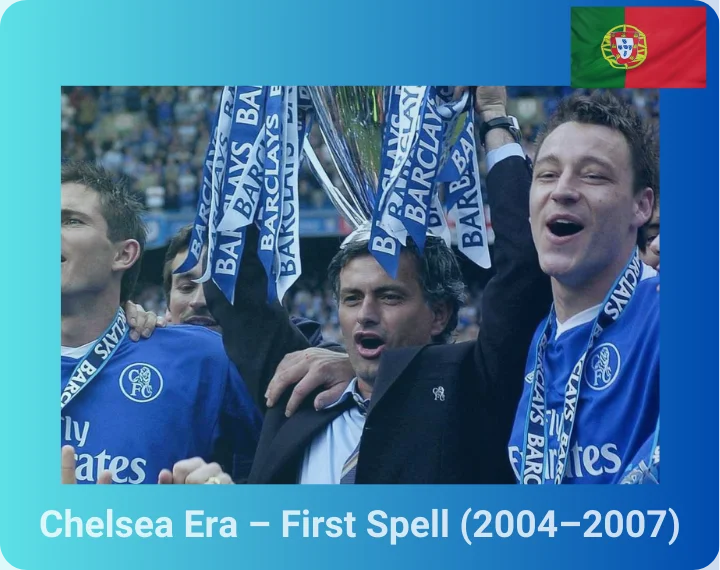
Conflicts, Charisma, and Departure
But during his time at Chelsea, Mourinho had a number of difficulties. His outspoken personality and sporadic arguments with the players and administration caused instability in the environment. Mourinho’s relationship with some of the club’s executives soured despite his on-field achievements. Following his second Premier League triumph, Mourinho departed Chelsea in 2007 after claiming he and the board were experiencing problems. His departure was as bit as stunning as his arrival, but it only served to reinforce his reputation as a manager who never backs down.
Inter Milan Glory (2008–2010)
Serie A Success and Tactical Adaptation
Mourinho relocated to Serie A and assumed leadership of Inter Milan in 2008. His stint at the club was highlighted by success, particularly in the Italian league. As Mourinho modified his strategies to suit the more defensively oriented Italian game, his tactical adaptability became clear. His Inter Milan team could play thrilling, counterattacking football and was also very good on defense.
Historic Treble: Champions League, Serie A, Coppa Italia
Inter Milan experienced one of the most incredible seasons in European football history under Mourinho. Inter completed an unprecedented trifecta in 2010 by winning the Coppa Italia, Serie A, and the UEFA Champions League. Specifically, winning the Champions League was a really wise strategic move. A masterfully executed game strategy that exploited Bayern’s flaws and nullified their strengths caused Bayern to lose the title match against Inter 2-0.
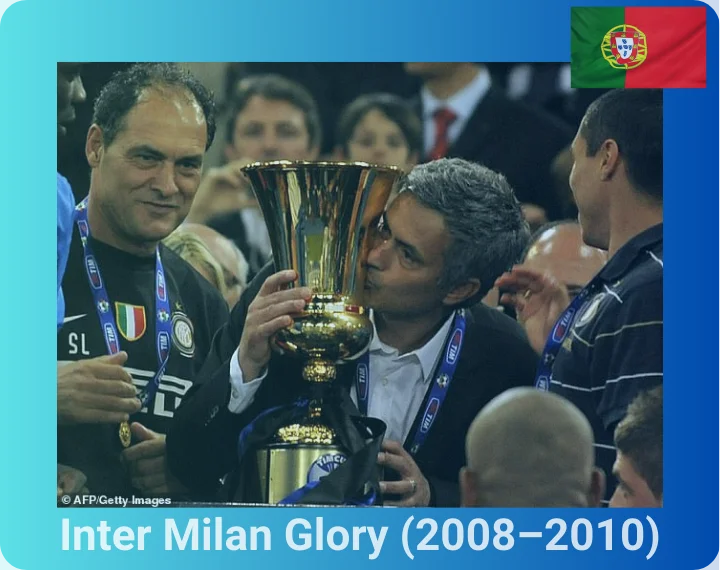
Defeating Barcelona – Mourinho’s Tactical Peak
One of Mourinho’s greatest achievements at Inter Milan was his ability to outwit Barcelona, the dominant force in world football at the time. In the 2010 Champions League semifinals, Mourinho’s Inter Milan team achieved the unthinkable, knocking out Barcelona in a thrilling two-legged tie. The defensive discipline and counter-attacking brilliance displayed by Inter in that series were a testament to Mourinho’s tactical genius.
Real Madrid Tenure (2010–2013)
Breaking Barcelona’s Dominance
There was Mourinho’s next assignment after he took over at Real Madrid in 2010. Barcelona, under Pep Guardiola, was the dominant force in football globally when he came. Although it wasn’t easy, Mourinho’s primary objective was to make Barcelona cede dominance of Spanish football, and he was successful in ways that would affect Real Madrid’s personality for years to come.
La Liga Record-Breaking Season
Mourinho led Real Madrid to a fantastic 2011–2012 season, setting La Liga records for goals (121) and points (100). Using strength, speed, and technical talent, the team played thrilling attacking football. Real Madrid won that season because to Mourinho’s tactically sound offensive adjustments, particularly his use of relentless pressing and counterattacks.
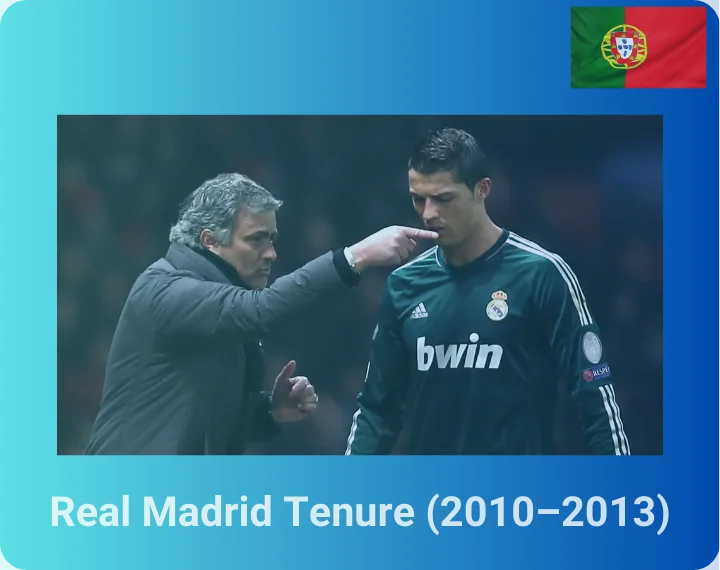
Intense Rivalry with Pep Guardiola
Mourinho’s rivalry with Pep Guardiola became one of the most talked-about aspects of his Real Madrid tenure. The two managers were polar opposites in their approach to the game, with Guardiola’s Barcelona defined by possession-based football and Mourinho’s Real Madrid focused on counter-attacking and defensive solidity. The rivalry culminated in several thrilling encounters, with Mourinho’s Real Madrid coming out on top in the 2012 La Liga title race.
Return to Chelsea and Later Premier League Ventures
Second Chelsea Spell – League Title in 2014–15
After returning to Chelsea in 2013, Mourinho led the squad to yet another title. He showed his tactical skill and ability to assemble a team that could compete at the highest level by leading Chelsea to the Premier League title in the 2014–2015 season. Mourinho revitalized Chelsea in his second term by bringing back the defensive consistency that defined his previous tenure.
Manchester United – Europa League & EFL Cup Wins
Mixed outcomes characterized Mourinho’s tenure at Manchester United. Despite winning the EFL Cup and the Europa League, he was frequently criticized for his defensive tactics and incapacity to bring out the best in important players during his stay. However, Mourinho’s commitment on winning trophies and tactical discipline made sure United remained competitive while he was manager.
Tottenham Hotspur – A Rebuilding Mission with Mixed Results
In 2019, Mourinho took charge of Tottenham Hotspur, taking over a club in transition. His mission was to bring stability to a team that had recently lost key players and had seen a dip in form. While he was able to bring some success, including reaching the 2021 League Cup final, his time at Tottenham was less successful, and he was dismissed in 2021.
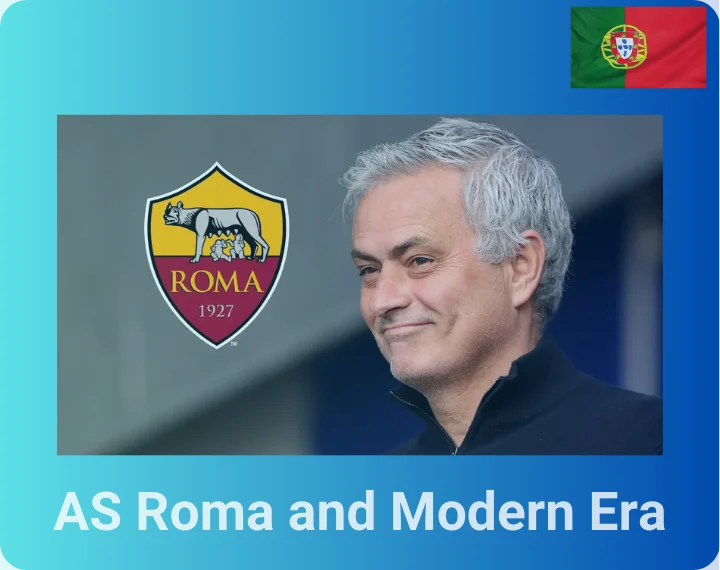
AS Roma and Modern Era
First UEFA Europa Conference League Champion
The following phase of Mourinho’s management career began in 2021 when he joined AS Roma. He established himself as one of the most prosperous managers in European football when he guided the team to victory in the first-ever UEFA Europa Conference League in his debut season. The victory demonstrated his capacity to adjust and succeed in novel situations.
Revival of Club Spirit and Tactical Discipline
Mourinho restored discipline and a sense of purpose to Roma, putting the team back in the running for the top Italian football titles. Under his direction, Roma’s identity was centered on his tactical discipline and emphasis on team unity.
Strong Fan Connection and Historic Feats
Mourinho’s rapport with Roma’s ardent supporters has been one of the pleasures of his time in Italy. Because of his ability to engage with the Roman faithful, his fierce on-field personality, and his desire to see the club win, he has won their affection.
Managerial Style and Tactical Identity
Pragmatism, Defensive Solidity, and Counter-Attacks
Mourinho is renowned for playing football with pragmatism. He frequently constructs defense-oriented sides and uses counterattacking football to take advantage of opponents’ weaknesses. His style has been characterized by his ability to quickly move between defensively organized teams.
Master of the “Big Game” Mentality
Mourinho is renowned for his ability to perform in high-stakes matches. His teams often shine in big games, whether it’s a Champions League final or a critical league match. His strategic approach to these fixtures ensures that his teams are always prepared for the biggest challenges.
Player Psychology and Motivation
Mourinho’s ability to manage and motivate players has been a key aspect of his success. He understands how to get the best out of individuals, using psychological tactics to inspire and push them to exceed expectations. His charisma and leadership make him one of the most influential figures in modern football.
Legacy and Influence on Modern Football
The Global Rise of the Charismatic Manager
The influence of Mourinho extends far beyond his tactical prowess. His leadership, charisma, and public presence, together with his tactical skills, have helped redefine what it means to be a football manager. His rise has had an influence on a generation of managers who want to emulate his leadership style on and off the floor.
Influence on Tactical Trends and Coaching Generations
It is impossible to exaggerate Mourinho’s impact on contemporary football. His tactical innovations have influenced coaching generations for a long time, particularly in the areas of defensive solidity and counter-attacking football. He stands out as one of the greats because of his ability to modify his technique to fit various leagues and difficulties.
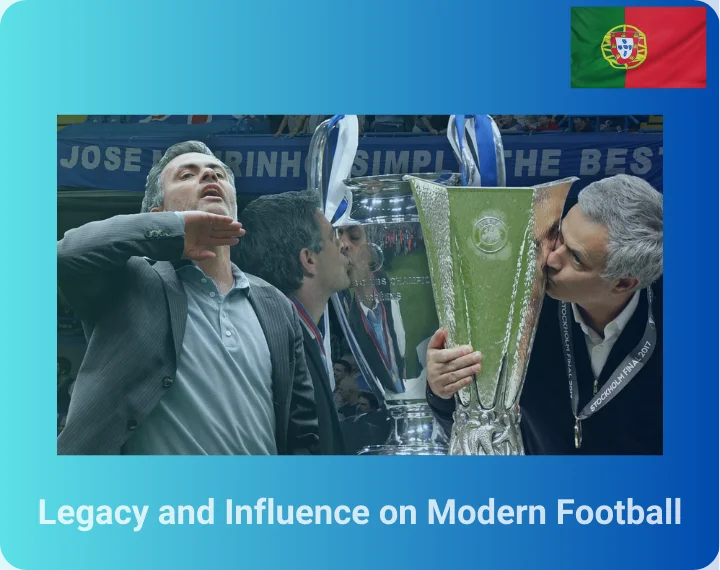
Controversial Yet Iconic – Redefining Success
Even though Mourinho has had a contentious career, there is no denying that he has changed the definition of football success. He will live on in the memories of future generations thanks to his management style, strategic acumen, and charismatic personality.
| Manager | Key Achievements | Tactical Approach |
| José Mourinho | Multiple league titles, Champions League victories | Pragmatic, defensive solidity, counter-attacks |
| Pep Guardiola | Multiple Champions League titles, La Liga wins | Possession-based football, high pressing |
| Sir Alex Ferguson | Numerous league titles, Champions League wins | Attacking football, player motivation |
